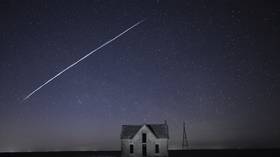Astronomers complain about SpaceX satellites

A recent study has warned that the rise in commercial satellites from companies such as SpaceX is polluting the low orbit and affecting astronomical photographs, which could leave Earth more prone to deadly asteroids.
The article, which was published in the Astrophysical Journal Letters on Friday, claimed that thousands of satellites from programs such as SpaceX’s ‘Starlink’ are causing an alarming number of twilight astronomical photographs to be covered in bright streaks.
While less than 0.5% of twilight images featured these streaks in 2019, the number increased to a whopping 18% in August 2021, meaning that nearly one in five twilight photographs are covered with the satellite lines.
The researchers claim the satellite trails “disproportionately affect twilight and high-air-mass observations,” which are used to track near-Earth asteroids and comets. Alarmingly, the sharp rise in trails could soon result in researchers missing certain asteroids and comets.
According to the study’s authors, the current numbers aren’t high enough to significantly affect the search, though the situation is changing fast.
On Sunday, SpaceX CEO Elon Musk boasted that 1,469 Starlink satellites were currently active in low orbit. Thousands of other satellites are also orbiting Earth, with a report in September placing the number at nearly 8,000.












